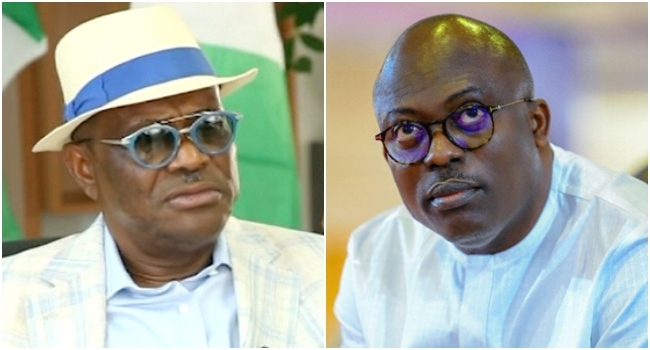The political landscape of Rivers State has been marred by a protracted and perplexing feud between former Governor Nyesom Wike, now the Minister of the Federal Capital Territory (FCT), and his successor, Governor Siminalayi Fubara. This discord, which has simmered since late 2023, escalated dramatically in March 2025 when President Bola Tinubu declared a state of emergency in Rivers State, leading to the suspension of Governor Fubara and the state’s House of Assembly. The underlying cause of this rift remains shrouded in ambiguity, with conflicting narratives and a conspicuous absence of clear communication between the key players. The resulting power vacuum and political instability have left the state in a precarious situation, raising concerns about governance and the future of Rivers State.
Adding another layer to this complex political drama, Rotimi Amaechi, a former governor of Rivers State and one-time Minister of Transportation, weighed in on the Wike-Fubara conflict. In a recent interview, Amaechi posited that the core issue revolved around disagreements over financial matters, suggesting a dispute over the allocation and distribution of funds. While offering this potential explanation for the rift, Amaechi simultaneously criticized President Tinubu’s declaration of a state of emergency, characterizing it as an unconstitutional overreach. This intervention from a prominent political figure further complicates the situation, introducing another perspective into an already convoluted narrative.
Jerry Omotsegunwa, the Special Assistant on Electronic Media to the suspended Governor Fubara, has publicly stated that Fubara remains unaware of the specific reasons behind Wike’s animosity. He characterized Amaechi’s assertion about monetary disputes as mere speculation, emphasizing that despite the protracted nature of the conflict, Wike has yet to provide a concrete explanation for his actions. This lack of clarity has fueled speculation and rumors, further exacerbating the political tension in the state. Omotsegunwa’s statement underscores the communication breakdown between the two factions, highlighting the urgent need for dialogue and reconciliation to address the underlying issues and restore stability to Rivers State.
Omotsegunwa’s comments shed light on the perplexing nature of the conflict. He recounted an incident where Fubara, facing impeachment threats, directly questioned the nature of his alleged offenses. Wike’s response, accusing Fubara of attempting to dismantle his political structure, provided little clarity and only deepened the mystery surrounding the root cause of their disagreement. This exchange, rather than illuminating the situation, further obfuscates the true nature of the conflict, leaving observers to grapple with conflicting interpretations and unanswered questions. The lack of transparency and open communication has only served to fuel speculation and deepen the political divide within the state.
The continued silence from Wike’s camp further intensifies the air of mystery. Lere Olayinka, Wike’s media aide, declined to comment on the matter when contacted, further contributing to the information vacuum surrounding the conflict. This reticence on Wike’s part fuels speculation and hinders any attempts to mediate or resolve the crisis. The absence of a clear and official statement from Wike leaves room for conjecture and potentially exacerbates the already tense political climate in Rivers State. This lack of transparency undermines efforts to understand the root causes of the conflict and find a path towards resolution.
The ongoing political crisis in Rivers State, marked by the suspension of Governor Fubara and the unresolved feud between him and his predecessor, Nyesom Wike, presents a significant challenge to the stability and governance of the state. The lack of clear communication, coupled with conflicting narratives and the intervention of other political figures like Rotimi Amaechi, has created a complex and opaque situation. The absence of a definitive explanation from Wike, coupled with his spokesperson’s refusal to comment, further deepens the mystery. The political uncertainty, fueled by this ongoing power struggle, raises serious concerns about the future of Rivers State and underscores the urgent need for dialogue, transparency, and a commitment to resolving the underlying issues that have led to this impasse. Until the key players engage in open and honest communication, the true nature of the conflict will likely remain shrouded in speculation, prolonging the political instability and hindering efforts to restore effective governance in Rivers State.


